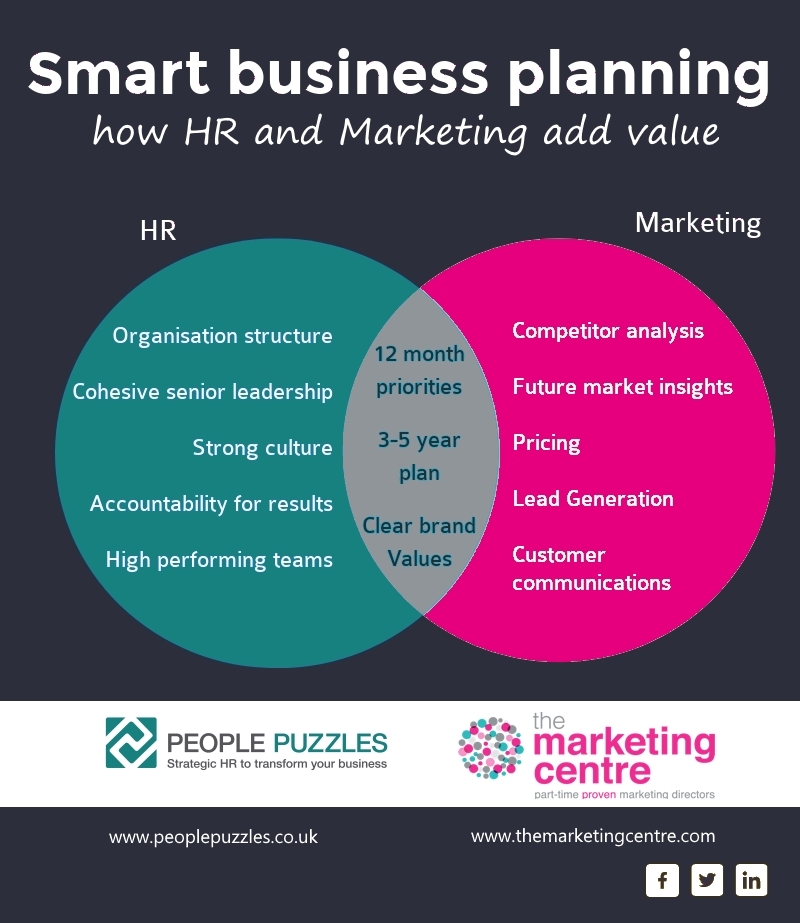When should HR align with Marketing?
You might think of HR and marketing as separate business functions with limited crossover. However, at People Puzzles we work closely with one of our sister businesses The Marketing Centre and we agree that HR and Marketing are very much dependent on each other, particularly in a growing businesses.
A successful marketing strategy + good people strategy = sustainable growth
Marketing can help you reach out to new customers, build brand awareness and develop your presence in the marketplace. However, if that growth isn’t backed up with a solid people plan, you risk not being able to deliver your brand promises to customers.
‘Marketing done well is about growing the business,’ explains Ged Leigh of The Marketing Centre. ‘But this can have a big impact on everyone working in it, especially if you’ve gone from a small team of 15 people and you suddenly get lots of new people coming in. HR and Marketing working in a joined up way are essential to managing that change and we often find that the speed of a business’s growth is dictated by how much change can the business absorb.’
Managing change
Fast growth can change a business out of all recognition, and it can be difficult for staff to adjust. A sound people strategy can ensure that the company stays true to its values even if the headcount has tripled in two years. ‘Change management is about recognising when the business is changing and identifying how to take people on the journey with you,’ continues Ged Leigh.
Communicating the vision to staff
Managing change also requires good internal communication, and this is where marketing and HR can work together. ‘When HR collaborates with marketing to communicate the vision, strategy, plans, rationale etc to staff, it can end up more creative, more engaging and therefore result in a bigger take up,’ says Ally Maughan of People Puzzles.
Improving performance
Employees can be seen as a ‘customer’ of the business, in that they put in time and expect money out. ‘The more employees understand the big picture, the more aligned they will be and the better work they can do,’ says Ally Maughan. Marketing can also help with attracting talent to businesses with a scarce talent pool. ‘Recruitment is an HR function if that business is attractive to work for. But if it isn’t, marketing might well have a part to play in getting people into the business,’ says Ged Leigh.
Representing the brand
Ally points out that employees often are the ‘face’ of the brand with customers. ‘Marketing departments are keen to get across a brand, a brand promise, a message about what the business does. Employees getting it right here are key, so they need HR to get their job done too.’
Alan Edwards, also of the Marketing Centre, agrees. ‘Most people experience the company through the people in the business and the brand. While marketing is responsible for how the brand is presented and received in the marketplace, the employees are the people who embody that brand and deliver on it.’
When staff and brand don’t align
If a brand promises what staff don’t deliver, it’s a marketing – and ultimately, a business – disaster. Alan gives an example: ‘A new hotel launches and the building is magnificent with a bar, restaurant and spa, etc. But if the service is appalling, it won’t survive, however great the marketing plan is.’
Championing the customer experience
The space where HR and marketing come together is when the brand is represented and delivered to people, says Alan, who sees the increasingly popular role of brand experience manager – who works in both HR and marketing spaces – as ‘the current direction of traffic,’ particularly in smaller businesses. ‘SMEs are often much closer to the people they’re serving than large businesses are and therefore the customer experience through employees is pivotal,’ he says.
It’s all about the strategy
It’s true that many aspects of HR (such as performance management or restructuring) might not have much in common with core marketing activities (such as lead generation or analysing the competition), when it comes to strategic thinking, marketing and HR are two sides of the same coin.
Ged Leigh emphasises the importance of all departments working together to achieve growth. ‘If you want to add 50% profit in the next five years, HR and marketing both have parts to play – as well as other parts of the business,’ he says. ‘One doesn’t come before the other.’
‘Like a marketing strategy, a people strategy seeks to help a business achieve its business growth plans,’ says Ally Maughan. ‘We focus on what the business needs to achieve, then what the various departments and teams need to achieve to make that happen.’
If you would like to further discuss how to make your HR and Marketing work harder together please drop us an email on [email protected].


